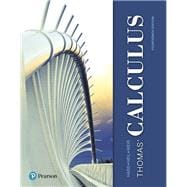For three-semester or four-quarter courses in Calculus for students majoring in mathematics, engineering, or science
Clarity and precision
Thomas' Calculus helps students reach the level of mathematical proficiency and maturity you require, but with support for students who need it through its balance of clear and intuitive explanations, current applications, and generalized concepts. In the 14th Edition, new co-author Christopher Heil (Georgia Institute of Technology) partners with author Joel Hass to preserve what is best about Thomas' time-tested text while reconsidering every word and every piece of art with today's students in mind. The result is a text that goes beyond memorizing formulas and routine procedures to help students generalize key concepts and develop deeper understanding.
Also available with MyLab Math
MyLab™ Math is an online homework, tutorial, and assessment program designed to work with this text to engage students and improve results. Within its structured environment, students practice what they learn, test their understanding, and pursue a personalized study plan that helps them absorb course material and understand difficult concepts. A full suite of Interactive Figures have been added to the accompanying MyLab Math course to further support teaching and learning. Enhanced Sample Assignments include just-in-time prerequisite review, help keep skills fresh with distributed practice of key concepts, and provide opportunities to work exercises without learning aids to help students develop confidence in their ability to solve problems independently.
Note: You are purchasing a standalone product; MyLab does not come packaged with this content. Students, if interested in purchasing this title with MyLab, ask your instructor for the correct package ISBN and Course ID. Instructors, contact your Pearson representative for more information.
If you would like to purchase both the physical text and MyLab, search for:
0134768485 / 9780134768489 Thomas' Calculus plus MyLab Math with Pearson eText -- Title-Specific Access Card Package, 14/e
Package consists of:
- 0134438981 / 9780134438986 Thomas' Calculus
- 0134764552 / 9780134764559 MyLab Math with Pearson eText -- Standalone Access Card -- Thomas' Calculus









